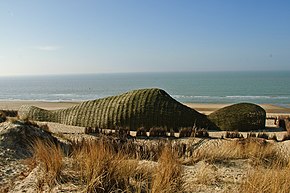
Environmental art is a range of artistic practices encompassing both historical approaches to nature in art and more recent ecological and politically motivated types of works.[1][2] Environmental art has evolved away from formal concerns, for example monumental earthworks using earth as a sculptural material, towards a deeper relationship to systems, processes and phenomena in relationship to social concerns.[3] Integrated social and ecological approaches developed as an ethical, restorative stance emerged in the 1990s.[4] Over the past ten years environmental art has become a focal point of exhibitions around the world as the social and cultural aspects of climate change come to the forefront.
The term "environmental art" often encompasses "ecological" concerns but is not specific to them.[5] It primarily celebrates an artist's connection with nature using natural materials.[1][2] The concept is best understood in relationship to historic earth/Land art and the evolving field of ecological art. The field is interdisciplinary in the fact that environmental artists embrace ideas from science and philosophy. The practice encompasses traditional media, new media and critical social forms of production. The work embraces a full range of landscape/environmental conditions from the rural, to the suburban and urban as well as urban/rural industrial.
- ^ a b Bower, Sam (2010). "A Profusion of Terms". greenmuseum.org. Archived from the original on 1 February 2014. Retrieved 29 January 2014.
- ^ a b Steinman, Susan. "WEAD, Women Environmental Artists Directory". WEAD, Women Environmental Artists Directory. Retrieved 3 February 2014.
- ^ Kastner, J. and Wallis, B. Eds. (1998) Land and Environmental Art. London: Phaidon Press.
- ^
- Gablik, S. (1984) Has Modernism Failed? New York: Thames and Hudson.
- Gablik, S. (1992) The Reenchantment of Art. New York: Thames and Hudson.
- Matilsky, B., (1992) Fragile Ecologies: Contemporary Artists Interpretations and Solutions, New York, NY: Rizolli International Publications Inc.
- ^ Weintraub, Linda. "Untangling Eco from Enviro". Artnow Publications. Archived from the original on 18 May 2015. Retrieved 8 February 2014.